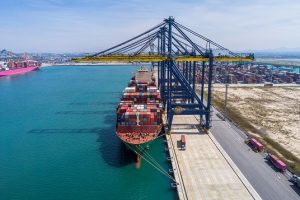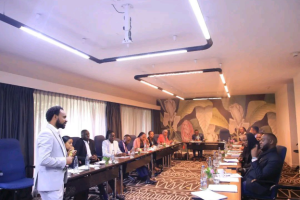When every New Year dawns, it is customary not only to make new pledges and resolutions but also to look back and see what went right and what did not. For countries, this is even more so because governments have huge responsibilities for running the country’s affairs and would like to be blessed by the positive feedback of their constituencies, their citizens. People expect everything from their governments, and every year they look back to see what has gone wrong and what has instead fulfilled their expectations.
Many things have happened to the country in the Ethiopian year 2015, but it could best be recalled mainly for a few events, one of which was the Pretoria Peace Deal. This deal ended the brutal conflict in the north of the country between brothers. It was a war that haunted everyone in the country and lasted two years. It was the cause of the huge losses, both materially and psychologically, but most significantly in terms of huge human sacrifices.
Moreover, it was two years during which Ethiopia had to battle on multiple fronts not only at home but also in the international sphere. On the one hand, there was the pressure from outside with all sorts of negative coverage of the war that Ethiopia was forced to be dragged in. On the other hand it had to preserve not only the integrity of the country and avoid its balkanization but also maintain its sovereignty. The government and people of Ethiopia had the moral and legal obligation to resist any pressure that had come from outside and even locally from certain circles because they knew that there were forces that rejoiced when they saw things were going the wrong way for Ethiopia.
Willingly or not, Ethiopia’s geopolitical position in the Horn of Africa and its being the source of a major trans-boundary river considered the means of survival for Egypt and Sudan makes it a center of attention even beyond the Horn. It is a volatile and delicate area reputed for being not always stable except for Ethiopia.
Hence, this internal conflict appeared to ruin the long-established reputation of Ethiopia as a stable, peaceful and reliable country. What is more, the way the conflict was covered by much of the international media did little justice to Ethiopia. Even traditional allies of the country failed to side with it provoking several negative repercussions not only politically and diplomatically but also economically.
Ethiopians from all walks of life had to stand by the side of their country to try and reject those allegations made against Ethiopia and explain how it had to do what it did. Ethiopia had to explain to the world that it did not need to be involved in such a ferocious series of battles that monopolized the attention of the people and the government. For a while, the entire focus of the government had to be deviated to resist the attacks that came from the north and at the same time created a serious jeopardy to the unity and integrity of the country. That was why the government had to disregard whatever comments came from the international community and ahead resisting and countering the attacks that were launched against its military and people by the TPLF leaders and forces.
Finally, in November 2015, two years exactly from the beginning of the first moves of the TPLF, the Ethiopian government and the TPLF finally met in Pretoria, South Africa after a series of attempts by many African statesmen and the AU itself to finally reach a deal of cessation of hostilities and embark on a full and lasting peace process.
It is to be noted that former Nigerian president Olesegun Obasanjo had the big resilience of going back and forth from Addis to Mekele in the efforts to frame a peace deal with the assistance of the AU good offices and later on the contribution of the former President of Kenya, Uhuru Kenyatta, the South African government, the US and EU diplomats who had their share of merits for the success of the peace deal.
Following the peace deal, Ethiopians began to breathe an atmosphere of peace and solace with the entire rhetoric changing because at the end of the day Ethiopia stopped suffering immense loss economically. The exact cost of the conflict may not be known yet, but it was sure that huge resources were squandered and the economic trajectory of growth and development of the country suffered remarkable setbacks. Furthermore, the image of the country was substantially damaged. Besides, it must have created delight for those forces that were actively trying to inflict huge damage on Ethiopia’s name and status in order to advance their own national interests at the expense of Ethiopia.
With the peace deal Ethiopians did triumph because many things were cleared and the fact that Ethiopia did not accept the interference of foreign forces in its internal problems was a reiteration of its sovereignty and independence despite the fact that it may still need the assistance of foreign forces to nurture its economy and make it reach new heights.
The diplomatic clouts of Ethiopia were once again restored to the pre-conflict period. Ethiopia regained its influence in Africa and showed to the world that it is not ‘a house of cards’ that could easily crumble at the first push, albeit severely challenged. It showed to the world its resolve and resilience by dismissing economic blackmail. It also resisted the multiple interventions of the UN Security Council meetings which tried to pass a resolution condemning Ethiopia for its legitimate resistance to attacks from various corners on the solicitation of certain powers. The year 2015 could thus be remembered as a significant landmark in the recent history of the country and it should be considered remarkable.
Another huge event for the year 2015 was the successful end of the first phase of the Green Legacy Initiative with more than twenty billion saplings planted and also the beginning of a second phase trying to expand it. This obtained the admiration and commendation of all environment campaigners and governments with Ethiopia noted as one of the few countries in the world doing what is expected of it in the efforts to curb climate change.
In fact in all major international conferences the Ethiopian government took part it has shared its experience. Now there are other countries particularly in the East African region emulating what Ethiopia had done to fight climate change. Recently, at the African Ministers of Environment conference carried out in Addis and the subsequent African Heads of State Environmental Summit carried out in Nairobi, Ethiopia’s name and its Green Legacy Initiative have been highlighted as a resounding success which needs to be replicated in other countries. For Ethiopia, this was a huge achievement for the year 2015.
What other important development marked the just ended year was Ethiopia’s admission to the BRICS group of Brazil, Russia, India, China and South Africa at the fifteenth BRICS summit carried out in South Africa, Johannesburg. Among the scores of expressions of interest to join the group, only six countries have been admitted including Argentina from Latin America, UAE, Iran and Saudi Arabia from Asia and Egypt and Ethiopia from Africa.
This inclusion was a result of huge diplomatic efforts by the Ethiopian government. It had had to fulfill certain conditions. Ethiopia in this sense has registered a huge success because once again it showed its immense economic potential with a huge young population. It is also considered as a huge gateway to Africa with its historical roles such as preserving its independence during colonialism and being a founding member of the UN and the AU with the headquarters in Addis Ababa.
The year 2015 however did not pass all as a bed of roses as there were certain challenges Ethiopians would not like to see continuing in 2016. One challenge is the inflation that afflicted the economy defying the efforts of the government with its home grown economic reforms. True, inflation continues to be a major threat for the entire world. However, the weaker economies are the ones that feel the bite more because the stronger ones avail multiple remedies.
The Ethiopian government has thus embarked on a second economic reform to combat inflation. It includes fostering substitution of imported goods, and increasing productivity at home to save foreign currency. Fostering investment with more facilitation lures foreign business ventures. Ethiopia’s joining the BRICS group is anticipated to be a stimulus in this direction.
The National Dialogue Commission, which has been operating actively to bring together all parties to a round table in inclusive dialogues, will present the new path for Ethiopia where all of its citizens feel they are adequately represented. The year 2016 hence presents certain challenges that cannot be underestimated nor neglected. The toil would lessen if every citizen collaborated voluntarily and in good faith. Ethiopia’s future would then be bright.
BY FITSUM GETACHEW
THE ETHIOPIAN HERALD WEDNESDAY 13 SEPTEMBER 2023



